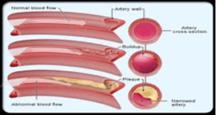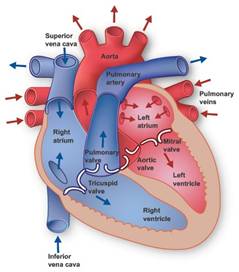Heart Health – Seven Simple Steps
The American Heart Association has released revised guidelines for achieving optimal heart health, beginning with seven things you can do to help reach that goal:
- 1. Get Moving
- 2. Eat Heart Healthy
- 3. Control Cholesterol
- 4. Manage High Blood Pressure
- 5. Maintain a Healthy BMI
- 6. Stop Smoking
- 7. Reduce Blood Glucose
1. Get Moving for Heart Health.
Regular physical activity lowers blood pressure, increases HDL (“good”) cholesterol levels, keeps blood sugar in check, and helps you control your weight.
2. Eat a for Heart Health.
A heart-healthy diet includes:
- 1. At least 4 1/2 cups of fresh fruit and vegetables per day.
- 2. At least two 3.5-oz servings of fish per week. Ideally, you should choose fish that contain omega-3 fats, like salmon, mackerel, lake trout, sardines, and herring.
- 3. At least three 1-oz servings of whole-grain products that are high in fiber (1.1 g or more of fiber per 10 g of carbohydrate).
- 4. Less than 36 oz of sugar-sweetened beverages per week (that’s less than three 12-oz cans of soda).
- 5. No more than two servings of processed meats per week.
- 6. No more than 1,500 mg of sodium per day if middle-aged or older.


3. Control Cholesterol for Heart Health.
A total blood cholesterol level of 200 mg/dL or higher puts you at risk for a heart attack or cardiovascular disease.
4. Manage Your Blood Pressure for Heart Health.
High blood pressure is the single most significant risk factor for heart disease. It’s not curable, but it is controllable. Ideally, your blood pressure should be below 120/80 mm Hg.
5. Maintain a Healthy BMI for Heart Health.
Body mass index (BMI) assesses your body weight relative to your height and indicates your level of body fat. An ideal BMI is lower than 25.
6. Stop Smoking for Heart Health
Smoking by itself increases the risk of coronary heart disease. When it acts with the other factors, it greatly increases your risk from those factors, too. Make a plan to quit smoking.
7. Reduce Blood Glucose for Heart Health.
Adults with diabetes are two to four times more likely to have heart disease or a stroke than adults without diabetes. If your fasting blood glucose level falls in the category of “prediabetes” — a level between 100 mg/dL and 125 mg/dL — weight loss can help get your blood glucose down.


